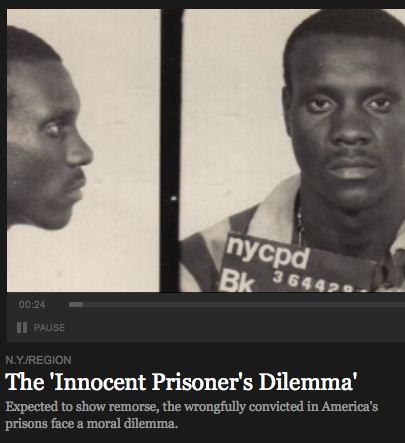You are currently browsing the tag archive for the ‘Rob Harris’ tag.
New York Times video The ‘Innocent Prisoner’s Dilemma pores over the profound moral dilemma innocent prisoners face when they present themselves to a parole board. The piece focuses on the case of Herbert Murray (above).
REMORSE IS A PREREQUISITE
Showing remorse for the crime for which they he/she was sentenced increases a prisoner’s chances of parole; the parole board wants to see contrition, wants to see the individual accept the charges, faults and responsibility the court defined many years previous.
One problem. What if the offender was wrongfully convicted? What if he or she IS innocent? The situation becomes Kafkaesque; he or she must agree to a terrible and false scenario (their agency in a crime) in order to escape a much worse scenario (further imprisonment). If an innocent man or woman acknowledges responsibility in order to curry favour, they then become the writers not only of their own history but of their own future. The individual will be forever tied to his or her parole record and the “admission” of guilt.
Herbert Murray’s story is shocking. He spent more than 29 years in prison (he was eligible for parole after 15). Murray only got out due to advanced interventions from his original lawyer and the Second Look Clinic at Brooklyn Law School.
DECISION MAKERS, KEY HOLDERS
Have you ever wondered who sits on a parole board and makes the decisions that affect tens of thousands of prisoners lives each year?
This article Convicted of Murder as Teenager and Paroled at 41 by Trymaine Lee details the job-track:
“Parole Board members, who must have a college degree and five years of experience in criminal justice, sociology, law, social work or medicine, can serve an unlimited number of six-year terms, earning $101,600 a year. By law, they must interview inmates in person and are required to consider their criminal histories, prison achievements and sense of remorse. Ultimately, though, parole decisions are subjective.”
It is great to read reporting that brings a focus to the rudimentary details of staffing and regulation, in this case that of the parole systems. There are many different arms to the criminal justice system and often they don’t compliment one another. In Murray’s case, the parole system reinforced the mistake of the judicial system.
This expository journalism reminds me of NPR’s investigative series on the bail system in January, 2010.
– – –
Thanks to Stan for the tip.


